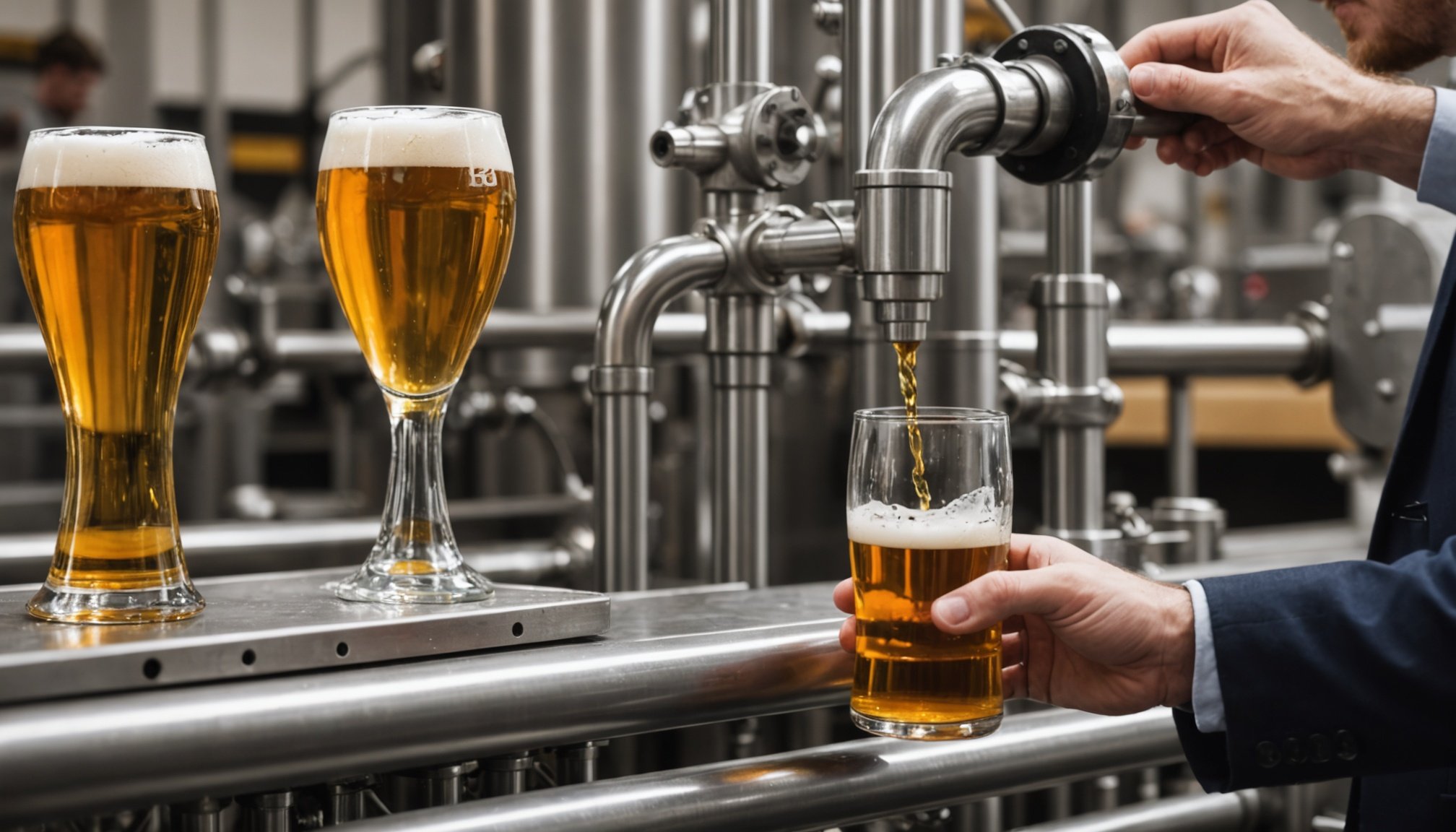Understanding Data Analytics in UK Breweries
The integration of data analytics in UK breweries is revolutionising the industry. With its application, brewery operations have seen significant improvements. Through advanced analytics, brewers can monitor and optimise various processes, from ingredient selection to brewing times. By analysing data, breweries have discovered more efficient methodologies, enhancing overall productivity.
Data-driven decision making plays a crucial role in this transformation. When breweries leverage data effectively, they gain critical insights into customer preferences, market trends, and operational bottlenecks. This information allows for strategic planning, helping them make informed decisions that drive growth and efficiency. By understanding usage patterns and product performance, breweries can innovate products that better cater to their audience.
Topic to read : Mastering Crowdfunding: The Essential Guide to Launching a Successful Campaign for Your UK Startup
Observing key statistical trends highlights the growing significance of analytics in the brewing industry. For instance, breweries using data analytics report a notable increase in product quality and consistency. Enhanced forecasting accuracy improves supply chain dynamics, preventing overproduction or shortages. This dedication to data-driven strategies ensures breweries remain competitive in a rapidly evolving market.
In summary, the role of data analytics in UK breweries is vital in enhancing operational performance. By harnessing the power of data, brewers can improve their processes, ensuring maximum productivity and aligning with industry standards.
Implementing Data Analytics Techniques
Breweries are harnessing data analytics to enhance operations and boost efficiency. Employing the right implementation strategies is crucial for success. Key data analytics tools can provide valuable insights into production processes, sales trends, and inventory management, transforming raw data into actionable information.
Common Data Analytics Techniques
Breweries typically utilise techniques like predictive analytics to forecast demand and optimise inventory. Quality control analytics help in maintaining consistent product standards by analysing historical data to predict and mitigate potential flaws. Additionally, sales and marketing analytics allow breweries to understand market trends and customer preferences, facilitating strategic decision-making.
Recommended Software and Tools
A variety of software solutions can aid in analytics implementation. Tools such as Tableau and Microsoft Power BI are popular for their ability to visualise data effectively. For breweries focusing on supply chain efficiency, SAP Analytics Cloud offers comprehensive management tools. Incorporating these tools can streamline operations and improve decision-making.
Step-by-step Guide
Begin by identifying data sources within brewery management systems. Next, select the appropriate analytics tools tailored to specific needs. Integrate these tools with existing operations, and establish regular data evaluation processes. Training staff on data interpretation ensures the long-term success of analytics implementation strategies.
Case Studies of Successful Data Analytics Applications
Exploring the power of data analytics, let’s delve into real-world success stories within the UK brewing industry. By implementing analytics, several breweries have transformed operations, driving new levels of efficiency and growth.
Profiles of UK Breweries That Have Successfully Adopted Data Analytics
BrewDog, a renowned UK brewery, exemplifies analytics in action. By leveraging data on consumer preferences and operational efficiency, they optimised production schedules and reduced waste. This data-driven decision-making enabled BrewDog to expand its market share and enhance customer satisfaction. Their success story underscores the importance of integrating analytics in every facet of a brewery’s functioning.
Another standout is Fuller’s Brewery. By analysing sales data, they accurately forecast demand, ensuring optimal stock levels and preventing costly overproduction.
Measurable Outcomes of Analytics-Driven Strategies
The adoption of such strategies has led to concrete, measurable improvements for these breweries. BrewDog saw a significant increase in revenue, while Fuller’s minimised losses through effective demand planning. These outcomes highlight the tangible benefits that data analytics brings to the brewing sector.
Lessons Learned from Successful Implementations
Effective adoption requires a strategic approach and a commitment to data integrity. These success stories illustrate that retaining a flexible attitude towards evolving data trends and incorporating continual assessment mechanisms are critical for enduring success.
Benefits of Data Analytics for Brewery Production
In the world of brewing, data analytics offers myriad opportunities for productivity gains and operational improvements. Direct impacts on production processes are evident in how breweries utilise data. By analysing brewing cycles, ingredient usage, and fermentation conditions, breweries can fine-tune their operations for efficiency. This attention to detail not only reduces errors but also optimises resource allocation, ensuring that each batch meets quality standards with minimal waste.
Utilising data analytics can result in significant cost savings and increased profitability. By predicting demand and adjusting production schedules accordingly, breweries can reduce inventory costs and mitigate the risks associated with overproduction. Furthermore, analytics can aid in identifying supply chain inefficiencies, enabling more strategic purchasing decisions and better price negotiations with suppliers.
Enhancing product quality and customer satisfaction is another profound benefit of data analytics. Through detailed analysis of consumer feedback and sales patterns, breweries can adapt their offerings to meet market trends and consumer preferences accurately. This adaptability ensures not only product alignment with customer expectations but also increased brand loyalty. The result is a more competitive market stance, reflecting not just in positive customer reviews, but also in stable sales growth over time.
Challenges of Implementing Data Analytics
Implementing data analytics in breweries presents a unique set of challenges. These barriers to entry are often due to limited resources and expertise in data interpretation. Many breweries face implementation hurdles due to the complexity of transforming traditional operations into data-driven ones. A primary obstacle is integrating new technology with existing systems, which often requires both time and money.
To overcome these barriers, breweries can adopt strategic approaches. Investing in staff training and change management schemes is crucial for a smoother transition. This helps align the team with new processes and encourages a data-driven culture. Additionally, choosing scalable and user-friendly analytics tools can ease the burden of initial implementation hurdles.
Training and change management are essential components to address the challenges breweries face in adopting data analytics. By educating employees on the importance and usage of analytics, they are more likely to embrace these changes. Leaders should also showcase the potential advantages, such as improved operational efficiency and better customer insights, to motivate and encourage staff. Moreover, by managing changes effectively, breweries can create a supportive environment that mitigates resistance and fosters long-term success.
The Future of Data Analytics in the Brewing Industry
With the rapid advancement of technology, the brewing industry is on the cusp of a transformative era, driven by innovation in data analytics. One of the emerging trends is the use of real-time data collection to optimise brewing processes. By leveraging IoT devices, breweries can meticulously monitor fermentation conditions, ensuring consistency in product quality.
Future trends also point towards the integration of AI for predictive analytics. Such systems can forecast demand fluctuations, enabling breweries to manage inventory more efficiently and reduce waste. This predictive capability is particularly crucial for small and medium-sized enterprises, which often face challenges related to overproduction or stock shortages.
As data analytics tools become more sophisticated, they are expected to play a pivotal role in customising consumer experiences. Be it through personalised marketing or targeted product development, breweries will harness analytics to better understand consumer preferences and adapt their strategies accordingly.
Looking ahead, the industry outlook suggests that data-driven decision-making will become a staple in brewery operations. The continuous evolution of analytics tools will likely enhance operational efficiency, boost profitability, and fuel innovation, setting a new benchmark for the brewing sector’s operational excellence.











